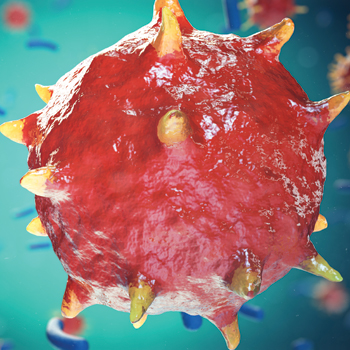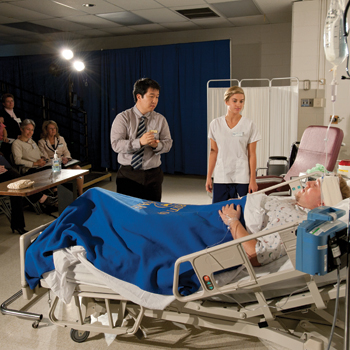Teach-back
Reflection on the past year as ACP president has taught lessons on advocacy and the scope of medicine, among other lessons.
This is my final President's Message column for ACP Internist. I intend to stay as active as possible in the College, not only this coming year as Immediate Past President, but beyond that as well. I'm in luck. The College is, as you know, committed to engagement and inclusion of all of its members, including its senior members. Yes, it's true—that's me, and I hope to continue to contribute for as long as I can.
But I also intend to refocus on what so many of us call our “day job.” In my case, that includes additional time caring for patients, mainly outpatients, but inpatients too, and teaching students, residents, and, in a less formal way, my junior colleagues, though I expect they have much more to teach me than I them.
So what have I learned from my tour of duty as College President that will be valuable to carry forward as I move back?
The technique of teach-back is a device, a very useful one I might add, to check that your patients have learned and can employ the information you have shared with them. Typically the technique is used at the end of the visit and sounds something like this: “We've talked about a lot today. I want to be sure I explained things properly. Can you share with me how you will use those inhalers that I prescribed?”
In my personal teach-back, here I reflect on what I learned this past year that I will carry forward. There is so much. Let's see if I can select a few things that will inform my role as clinician-teacher, looking forward to additional time in practice. What have I learned?
First, advocacy matters. Others have written about the alliterative spectrum from agency to advocacy to activism. Internists, by the very nature of their work, act as their patients' agent, guiding them as they navigate the increasingly complex system of health care. The College provides opportunities to advocate for our patients, both regionally and nationally, and to move toward activism; that is taking steps, many steps, in fact, to bring about systematic change.
The ACP President is privileged to represent the College in its forward-looking agenda to improve health care access, to promote high-value care, to enhance payment for physicians while reducing administrative burdens, and to support education and research, which are the engines that will propel the health care delivery system forward. Not every internist cares to be an activist, but having witnessed the important work the College does in the area of public policy and governmental affairs, I strongly believe we all have the responsibility, including front-line clinicians, to support and guide ACP's efforts in this arena, both at the chapter level and nationally. Our public policy staff need our stories, for example, about the impact of health care coverage on actual patients. I'll be sending in as many as I can.
Second, I will carry with me a revised and expanded view of the scope of medicine and the role of physicians. I talked about this in a recent President's Message column, “Doctors with Borders,” in the March ACP Internist. I made the point that the sphere of ACP's interests cannot be limitless; it should reflect our mission and our expertise. It must accommodate not just the traditional view of health and biomedical determinants of disease but also the socioeconomic determinants and the environmental determinants, and focus not just on the patient in front of you but on populations, including populations subject to injustice and disparities. I learned a great deal about bias, both explicit and implicit, and I hope to carry these lessons with me back to the clinic and back to the bedside. It is exciting to see the issue of socioeconomic determinants of health featured at Internal Medicine Meeting 2018, which will also include a global-level discussion of that same subject at the International Forum.
And third, identity matters. This year is not the first year ACP members asked themselves, “What does it mean to be an internist?” I have a strong hunch Heinrich Stern, MD, asked that very question of his colleagues in New York City before the founding of the College in 1915. Fast forward to 2011 and one finds the Board of Regents appreciating the need to redefine internists and arriving at the following:
“Internal medicine physicians are specialists who apply scientific knowledge and clinical expertise to the diagnosis, treatment, and compassionate care of adults across the spectrum from health to complex illness.”
I have signed more than 100 letters to legislators and governmental agencies that have included this definition, and I have had a positive reaction each and every time I've read it. I believe in it and hope to exemplify it as a practicing clinician-teacher.
But I also appreciate that the time has come to examine further what it means to be an internist. Mid-level providers, industry-based walk-in clinics, other medical professions, and even virtual health care services crowd the space previously held by internists, while the aforementioned administrative burdens challenge our morale if not our wellness.
I believe, however, that the future is bright. As President, I have had the opportunity to see and meet so many spectacular internists in the United States and internationally. Concerned about the future of internal medicine? Drop in on a Doctor's Dilemma session at an Internal Medicine Meeting and see the future. You will be assured that the baton has been passed to very capable hands. More telling, though, is what I've heard from so many members throughout this year. There is concern that internists today might be losing status as the outstanding diagnostician/clinician, able to provide what other professionals cannot. This concern will be with me as I increase my time as a practicing clinician and teacher. We all need to understand our identity and help shape who we are. The College has already formed a task force on the identity of the internist. I am confident that this issue will receive the attention it deserves.
That is my teach-back, at least part of it. I could go on to include lessons learned from working on so many issues with so many committed and inspirational people—members, leaders, and staff—throughout our national chapters and our international chapters as well. It's been a very special experience. But as I ask myself during this teach-back, just as we ask our patients as their office visits come to a close, what three things I will remember that will change things going forward, for me it is the importance of advocacy, the scope of internal medicine practice, and how important it is that as internists we appreciate who we are and what we provide.
It has been a privilege serving as your President and sharing my thoughts in this column. Please let me hear from you.




